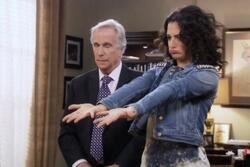Is Rose Weissman in on the Joke?
The season three finale of The Marvelous Mrs. Maisel ends with an argument. Both Midge and her mother, Rose, have gone through a slew of changes during the previous two and a half seasons leading up to this fight. Midge has been left by/left her husband, hooked up with him, accidentally married him again, and made enormous strides in her career as a comic. Rose has stood up for herself against her extended family, assumed real control of her immediate family’s future, and potentially set some actual career goals. Set in a period of rapid societal changes, Mrs. Maisel often positions the duo as two sides of the same coin: the image of the “perfect” modern American woman. While Midge is defying norms and gallivanting around, Rose can be found holding down the fort. She is usually a foil to Midge and her less-than-sensible choices. When they’ve clashed before, it’s been clear to me who the show wants me to side with. But in this face-off, a blistering conflict of their worldviews, I was left completely unsure of who I was supposed to be rooting for.
Rose’s characterization throughout Mrs. Maisel could be described as uneven, at best. We first meet the uppity matriarch in season one as she fusses over the prettiness of her infant granddaughter. Immediately, the audience is made aware that she is obsessed with appearance. She places value on the size and decor of her apartment, her personal aesthetics, and society involvement. For all the nuanced Jewish-isms the show throws at viewers, Rose’s Jewishness is depicted in the most superficial, stereotypical ways: the echelon represented at her holiday meal, a hat to wear to synagogue that’s more impressive than another woman’s, the quality of community gossip she is privy to. Her commitment to status is woefully connected to her interactions with the world around her, and to her relationships with everyone from peers to maids. She is under the impression that she has raised her only daughter, Miriam, with similar values—the ones she has determined make or break the life of a mid-twentieth century, attractive, and upper-class New York woman. While the show primarily follows Midge as she builds a new life for herself on her own terms, it also focuses on Rose, whose life continually falls apart in ways that don’t seem to lead to any real payoff.
In season two, when Rose runs away from home to recapture a sense of glory in Paris, I had a sinking feeling that the “plot twist” was, in actuality, an excuse for the (talented) production design team to try their hand at creating a glittery, idealized version of the City of Lights in the 1960s. I wanted to give the show a chance, though, to actually expand on and explore Mrs. Weissman’s identity. But they return to New York, with little mention of Paris, or of her and her husband, Abe’s, revelation that the simple things in life are best. Season three sets her up for potential development in a similar way: It is revealed, after Abe recklessly quits his job at Columbia University, that Rose has been financing her family’s lifestyle for all this time with the money from a trust fund provided by her wealthy oil-industry family. That twist explains a lot; my father, a college professor, has griped about how unrealistic the Weissmans’ lifestyle is. This development about Rose’s trust fund also could have been a fabulous way to incorporate a part of American Jewish history not related to brisket: Jewish women in the old and new world were traditionally the managers of the family’s funds, budgeting, allocating, and generally keeping the family afloat while the men worked.
Unfortunately, although Rose gets a fiery monologue in which she rejects her family’s wealth on the basis of their sexist attitudes, this plot also goes nowhere except Queens, where Abe and Rose have moved in with Joel’s parents (in a forced and unrealistic attempt to squeeze situational comedy from a group of people who can’t stand each other). Abe and Rose should have had the chance to explore their identities on their own and as a couple, instead of experimenting in cohabitation with their daughter’s ex-husband’s parents. We see Rose consume more alcohol than ever and make the kinds of mistakes she would eviscerate her daughter for. She acts out, she’s raucous, she’s lewd. As a drunken flirt, her continued description of Miriam’s comic career as “prostitution” is extreme and puzzling. It seems that, for however much progress the Sherman-Palladino powerhouse wants us to think she’s made, she remains confusingly obtuse and resistant to the changing times.
Midge likes to rag on her mom in her stand-up routines, teeing her up for a hit as the perennial symbol of the nagging, overprotective Jewish mother. (Can you think of any similar stereotypes that have permeated popular culture about Jewish fathers? Because I can’t.) It’s so unfortunate that Rose must inhabit this trope alongside the wannabe-iconoclastic Midge and the exuberant Abe. The presence of such a caricature of Jewish representation calls into question who is supposed to be laughing at Rose’s antics. Are Midge’s audiences stand-ins for us TV viewers: not all Jewish, but all ready to hear a grown woman complain about her over-involved mother? And if we hear Midge mock her mother’s worldview while simultaneously being told that Rose is a growing protagonist in her own right, who gets the sympathy?
In the season three finale, Midge explodes at her mother for approaching her ex-fiancé, Benjamin, at his workplace as part of her burgeoning matchmaking enterprise. But by this point, Midge’s ignorance and carelessness have shifted her status from the show’s protagonist to a role more accurately described as anti-hero. On the flipside, Rose has crossed boundaries, while continuing to expect a lifestyle she isn’t necessarily deserving of. I’m curious as to what the showrunners were trying to accomplish with the mother-daughter standoff, and with Rose’s storyline in general. She is a character with so much potential beyond “scheming Jewish mother,” and I hope, in the upcoming season, the characteristics that have been hinted at, but never developed, are finally explored fully.







Okay, so Dan Greenberg still has a lot to answer for since he concentrated on Jewish mothers instead of Jewish fathers back in the sixties. However,"controlling upper class rich woman who cares passionately about appearances and little else" is a stereotype that cuts across cultural and religious lines. The scheming mom in this series is Jewish, but the problematic stereotype is the rich bitch, never mind her cultural heritage. Betty Warren's mother in "Mona Lisa Smile" comes to mind, but there are others.